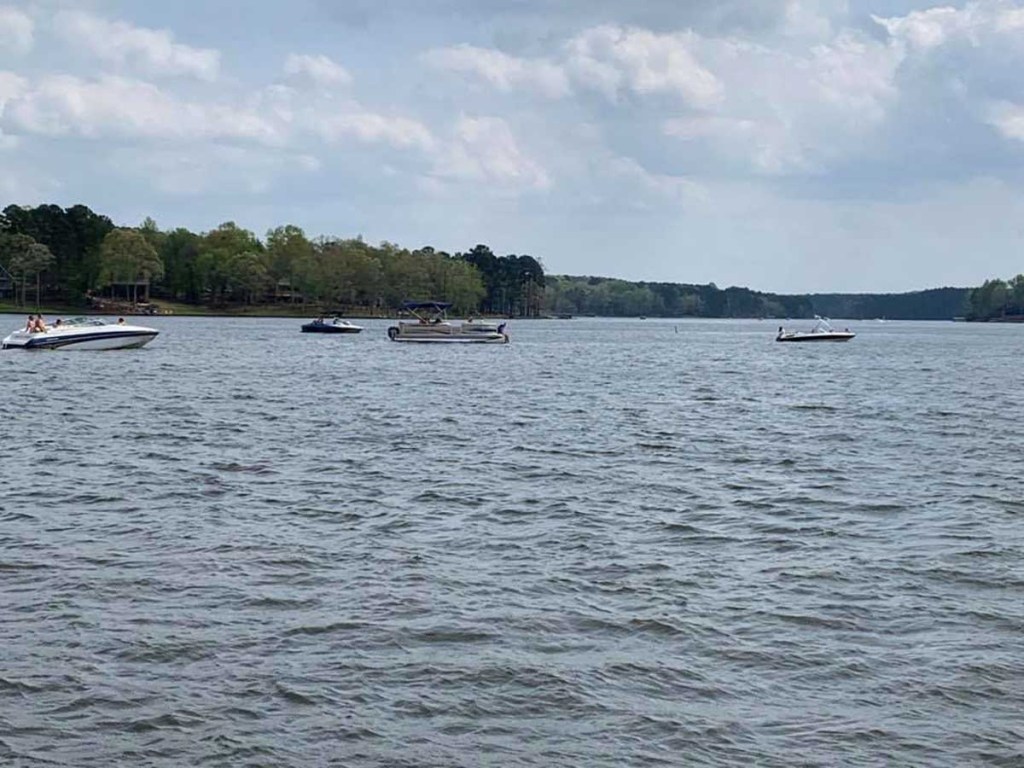State enforces coronavirus guidelines in parks, lakes
Published 1:45 pm Monday, March 30, 2020

- The Law Enforcement Division of the Georgia Department of Natural Resources posted this photo on Facebook as a good example of boaters practicing social distancing on a sandbar in Lake Oconee on March 29.
ATLANTA — A photo of dozens of people partying on boats at Lake Oconee sparked a social media firestorm this past weekend, begging the question: who is enforcing social distancing at parks and on lakes?
On March 23, Gov. Brian Kemp issued an executive order banning gatherings of 10 or more people and called on Georgia residents to report any businesses or groups that don’t comply.
Meanwhile, many Georgians are taking to outdoor activities to avoid isolation in their homes, but with crowds at parks in both urban and rural areas, officials are grappling with how to enforce a six-foot-distance rule.
In an announcement Sunday, Kemp gave the Georgia Department of Natural Resources authority to enforce the ban on large gatherings and social distancing guidelines at parks and lakes.
“As we deal with the effects of coronavirus with school and business closures, people are eager for a change in scenery after days at home,” Kemp said. “They are traveling to nearby counties, heading outdoors for fresh air and maximizing family time. Some are going to vacation homes, and others are hitting the lake, hiking trails, or campgrounds. We, too, enjoy exploring Georgia, but we urge people to stay mindful of social distancing, follow best practices, and avoid large crowds.”
The Department of Natural Resources will enforce the limit on gatherings of 10 or more and social distancing requirements on Georgia waters and in campgrounds. Officials will be actively monitoring popular hotspots and — if necessary — will signal parties to disband with a bullhorn.
In a Facebook post, the Law Enforcement Division of DNR said it will be enforcing social distancing and large gathering rules for individual boats, boats tied together, sandbars, shoreline and “everywhere else.”
Col. Thomas Barnard, director of the DNR law enforcement division, said he was patrolling Lake Oconee this weekend and said there were no issues with social distancing on sandbars and islands, but sometimes, boaters forget rules apply on the water as well.
“It’s human nature, right, we practice these things — either at home or when we’re in the grocery store — and then we hop on the lake and sometimes we forget what we were doing,” he told CNHI. “ … The water and the parks, those are the two areas that are still open that allow people to get out in and get that mental break from things and get out of the house. Sometimes I think they just forget.”
Barnard said the groups he’s approached about social distancing have been responsive. After DNR law enforcement officials outline the governor’s guidelines, groups have dispersed.
“The majority of people want to do the right thing,” he said.
Barnard said in extremely rare circumstances, in which groups are not listening to DNR rules, the offense could fall under Georgia code section 16-5-60 outlining reckless conduct — where a person can be charged with a misdemeanor for endangering “the bodily safety of another person by consciously disregarding a substantial and unjustifiable risk that his act or omission will cause harm or endanger the safety of the other person.”
The code section includes HIV criminal justice laws that the Georgia General Assembly was reforming before the legislative session was suspended.
Barnard said the code section “falls in line with the governor’s orders,” but he doesn’t expect enforcement to go that far.
Barnard has been responding to statewide incidents for nearly three decades, such as natural disasters. But this public health emergency is different, he said, in that Georgians play the biggest role in curbing spread.
“The citizens of this state and of course across this nation, play the biggest role in fighting this,” he said. “Every time somebody puts their hands under the faucet and washes them and practices social distancing, that’s another swing at COVID-19.”
Atlanta Mayor Keisha Lance Bottoms and other locally elected officials across the state have issued warnings to constituents that they may shut down public parks if residents don’t abide by social distancing guidelines.



